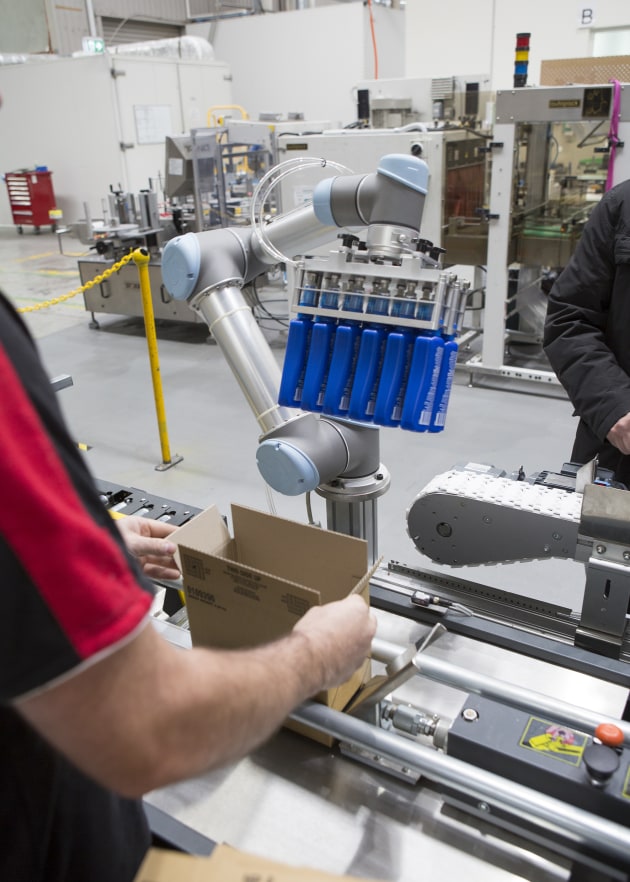A Victoria-based manufacturer has become the first to use an end-of-line automated palletising system which incorporates a collaborative robot.
For use with Australian standard pallets and developed by Andrew Donald Design Engineering (ADDE), the system incorporates Universal Robots’ UR10 robot to create a collaborative and flexible palletiser.
With most packing operations still finishing with an operator loading a carton onto a pallet manually, ADDE saw an industry need for a solution which could automate one of the most physically demanding and back-injury prone tasks on the production line.
ADDE’s response was to create the Zero Footprint Palletiser (ZFP), which takes no more space than a pallet on the floor and an operator, and allows manufacturers to generate greater efficiency and safety across operations, while also enabling employees to work closely in collaboration with the palletiser.
ADDE created the collaborative case packing and palletising system for Baxter Laboratories, which uses a Universal Robots’ UR5 robotic arm to assist in packing 12 Aerogard insect repellent spray bottles into a semi-automatic carton assembler.
ADDE’s ZFP, which integrates a UR10 robotic arm, then packs the boxes onto a pallet, ready to be distributed.
The ZFP can place up to six cases per minute onto a pallet and carry boxes weighing up to 8kg. No safety guarding is required to use the system, although this should be subject to a risk assessment first. The ZFP can also be configured for single pallets for minimum footprint or in a double pallet configuration for automatic pallet changing.
According to Ian Tilley, operations manager at Baxter Laboratories, prior to implementing ADDE’s solutions Baxter Laboratories employed three staff members working along the production line.
Two workers were responsible for packing the manufacturer’s Aerogard insect repellent sprays, while a third person placed the boxes onto a pallet by hand.
“The whole process has become safer and more efficient," he said.
"We now have one employee who erects the box, waits for it to be filled by the UR5, then pushes the box to the tape sealer before it is then passed along to the ZFP, which picks up the finished box and places it onto a pallet for distribution. The other employees formerly performing the palletising and packing have been redirected to safer, more value-adding tasks that are less monotonous.
“One of our most monotonous and difficult jobs is actually stacking pallets, so we looked at the market and couldn’t find anything in the traditional space without big robots and big cages. We needed something safe and space-efficient. Having the minimal factory floor footprint that we required, we selected and thoroughly risk-assessed the ZFP before deciding it could be safely operated without guarding.”
Baxter Laboratories has plans to implement four more ADDE-designed palletisers which are already on order and soon to be installed.
To create the ZFP, ADDE started with a UR10 robot, which can work without safety caging or barriers (subject to a risk assessment) and then added the hardware and software needed to achieve an affordable, minimal footprint and easy-to-deploy solution that can reach an Australian standard pallet.






